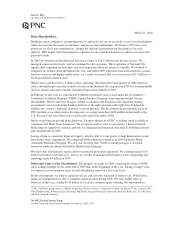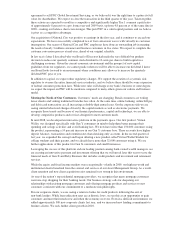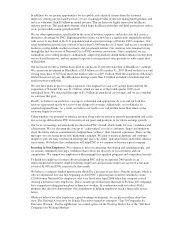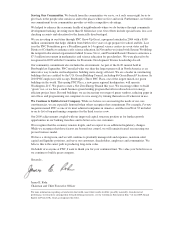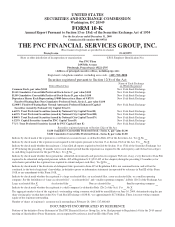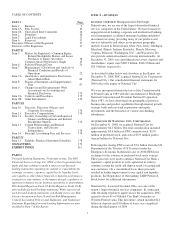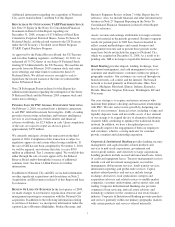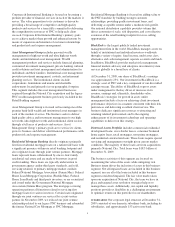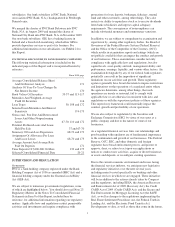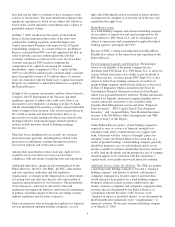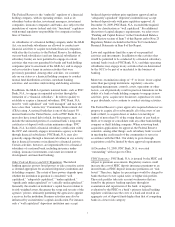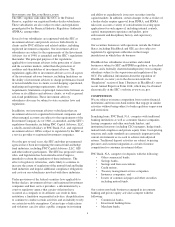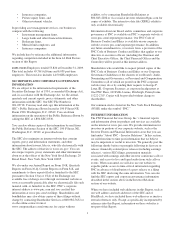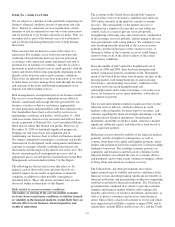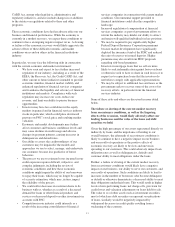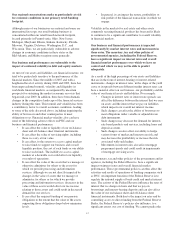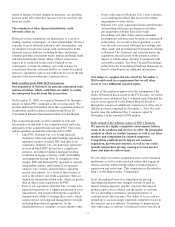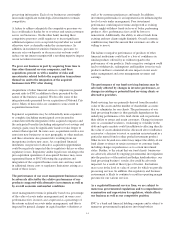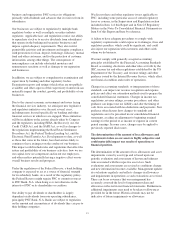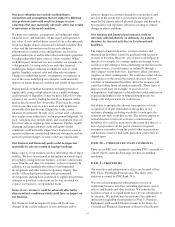PNC Bank 2009 Annual Report Download - page 10
Download and view the complete annual report
Please find page 10 of the 2009 PNC Bank annual report below. You can navigate through the pages in the report by either clicking on the pages listed below, or by using the keyword search tool below to find specific information within the annual report.
have had and are likely to continue to have an impact on the
conduct of our business. The more detailed description of the
significant regulations to which we are subject that follows is
based on the current regulatory environment and is subject to
potentially material change.
On May 7, 2009, the Board of Governors of the Federal
Reserve System announced the results of the stress tests
conducted by banking regulators under the Supervisory
Capital Assessment Program with respect to the 19 largest
bank holding companies. As a result of this test, the Federal
Reserve concluded that PNC was well capitalized but that, in
order to provide a greater cushion against the risk that
economic conditions over the next two years are worse than
currently anticipated, PNC needed to augment the
composition of its capital by increasing the common
shareholders’ equity component of Tier 1 capital. In May
2009 we raised $624 million in new common equity at market
prices through the issuance of 15 million shares of common
stock. In connection with the Supervisory Capital Assessment
Program, we submitted a capital plan which was accepted by
the Federal Reserve.
In light of the economic uncertainties and the actions taken by
Congress, the US Department of the Treasury and other
regulatory agencies to address the credit crisis, there is an
increased focus by regulators on lending activities by banks
and the relationship between those activities and governmental
efforts to improve this situation. Also at least in part driven by
the current economic and financial situation, there is an
increased focus on fair lending and other issues related to the
mortgage industry. Ongoing mortgage-related regulatory
reforms include measures aimed at limiting mortgage
foreclosures.
There has been a heightened focus recently on consumer
protection issues generally, including those related to the
protection of confidential customer information and fees
assessed on deposits and credit card accounts.
Among other areas that have been receiving a high level of
regulatory focus over the last several years has been
compliance with anti-money laundering rules and regulations.
Additional legislation, changes in rules promulgated by the
Federal Reserve, the OCC, the FDIC, the SEC, other federal
and state regulatory authorities and self-regulatory
organizations, or changes in the interpretation or enforcement
of existing laws and rules may directly affect the method of
operation and profitability of our businesses. The profitability
of our businesses could also be affected by rules and
regulations that impact the business and financial communities
in general, including changes to the laws governing taxation,
antitrust regulation and electronic commerce.
There are numerous rules governing the regulation of financial
services institutions and their holding companies. Accord-
ingly, the following discussion is general in nature and does
not purport to be complete or to describe all of the laws and
regulations that apply to us.
B
ANK
R
EGULATION
As a bank holding company and a financial holding company,
we are subject to supervision and regular inspection by the
Federal Reserve. PNC Bank, N.A. and its subsidiaries are
subject to supervision and examination by applicable federal
banking agencies, principally the OCC.
Because of PNC’s voting ownership interest in BlackRock,
BlackRock is subject to the supervision and regulation of the
Federal Reserve.
Parent Company Liquidity and Dividends. The principal
source of our liquidity at the parent company level is
dividends from PNC Bank, N.A. PNC Bank, N.A. is subject to
various federal restrictions on its ability to pay dividends to
PNC Bancorp, Inc., its direct parent. PNC Bank N.A. is also
subject to federal laws limiting extensions of credit to its
parent holding company and non-bank affiliates as discussed
in Note 23 Regulatory Matters included in the Notes To
Consolidated Financial Statements in Item 8 of this Report,
which is incorporated herein by reference. Further information
on bank level liquidity and parent company liquidity and on
certain contractual restrictions is also available in the
Liquidity Risk Management section and in the “Perpetual
Trust Securities”, “PNC Capital Trust E Trust Preferred
Securities”, and “Acquired Entity Trust Preferred Securities”
sections of the Off-Balance Sheet Arrangements and VIEs
section of Item 7 of this Report.
Under Federal Reserve policy, a bank holding company is
expected to serve as a source of financial strength to its
subsidiary bank and to commit resources to support such
bank. Consistent with the “source of strength” policy for
subsidiary banks, the Federal Reserve has stated that, as a
matter of prudent banking, a bank holding company generally
should not maintain a rate of cash dividends unless its net
income available to common shareholders has been sufficient
to fully fund the dividends and the prospective rate of earnings
retention appears to be consistent with the corporation’s
capital needs, asset quality and overall financial condition.
Additional Powers Under the GLB Act. The GLB Act permits
a qualifying bank holding company to become a “financial
holding company” and thereby to affiliate with financial
companies engaging in a broader range of activities than
would otherwise be permitted for a bank holding company.
Permitted affiliates include securities underwriters and
dealers, insurance companies and companies engaged in other
activities that are determined by the Federal Reserve, in
consultation with the Secretary of the Treasury, to be
“financial in nature or incidental thereto” or are determined by
the Federal Reserve unilaterally to be “complementary” to
financial activities. We became a financial holding company
as of March 13, 2000.
6

